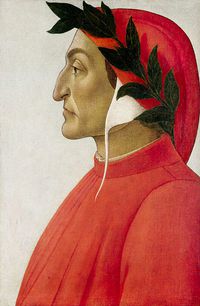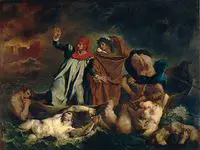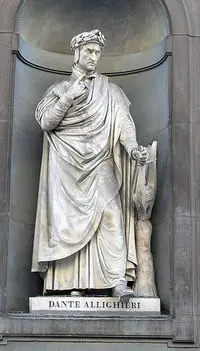The Value of $289 Art Who Wrote Divine Comedy

A portrait of Dante by Botticelli c 1480
Dante Alighieri (1265-1321), is widely regarded as one of the greatest poets in the Western literary tradition and he is viewed equally the national poet of Italian republic. He was a literary giant that had a decisive impact on the development not just of Italian literature but on many other aspects of the Renaissance.
Dante made significant contributions to the early Renaissance and many of his ideas and themes were developed by after writers, artists, and thinkers. Dante contributed to the evolution of humanism, the employ of the vernacular in literature and challenged the hegemonic nature of the Church building and these helped to generate the cultural and intellectual changes known as the Renaissance, which transformed the earth forever.
Who was Dante Alighieri?
Dnte was born into one of the leading families in Florence. His mother died when he was twelve, and he was contracted while still a young male child in marriage to a girl who belonged to another leading family. At some time, he saw and fell in beloved with a young daughter called Beatrice, and she was the beloved of his life and became his muse. Dante married Gemma Donati, just he remained in beloved with Beatrice even after her untimely death. The decease of his love led to the poet studying philosophy and theology, every bit he sought some pregnant in life.
Dante, similar his family unit, belonged to i of the master factions in the city whose politics were oftentimes bloody. Florence was divided between the pro-Purple Ghibellines and those who supported the Papacy known equally the Guelfs. The origin of this dispute lay in the various conflicts between the Holy Roman Emperor and the Pope. The poet fought at the Boxing of Campaldino (1289) when the metropolis's Guelph faction defeated the Arezzo Ghibellines. After the victory, the Guelph factions changed the constitution and Dante had to enroll in a Guild, an association of tradesmen to remain a denizen.[ane]

A 19th century painting of Dante in Hell
However every bit was typical of the fractious politics in Late Medieval Italy, the Guelphs soon divided into ideological lines, and they became 2 mutually hostile factions the White and Black Guelphs. The White Guelphs, the party of Dante somewhen expelled their former allies and colleagues. Even so, the Whites returned with the support of Charles Valois and ousted the Blackness faction from the authorities of the city, and this led to the exiling of many prominent Florentines.[2]
Dante was exiled due to trumped up charges of abuse. Dante could have returned to his native city if he swore an oath to the Whites and paid a fine. He refused to do both, and this was unsurprising because he had integrity.[three] Moreover, he was a political party to several attempts to expel the Black Guelphs,' but these were all failures. Dante became a permanent exile. He was forced to wander Italy. He became dependent on the generosity of powerful nobles.
In 1306, he was in Bologna but was later forced to go out with the other Florentine exiles. Information technology appears that he concluded upwards in Padua for a fourth dimension and he may have even visited Paris. Dante constitute exile daunting and wrote 'how hard a path it is for one who goes ascending and descending others' stairs.''[4] But it was during his period of exile that he concentrated on his poetry and prose works. Exile may take difficult, but information technology made him extremely productive.
In addition to his literary efforts, he remained active both as a pol and a diplomat. He was tireless in his efforts to render to his beloved Florence. All his endeavors to return to his home were thwarted. Dante accepted an invitation from the ruler of Ravenna to stay in that urban center. It was in Ravenna that the poet finished the last of his great works and he died in 1321.[v] He was cached with high honors in Ravenna, and Ravenna has never returned his remains to his native Florence.
What were Dante's most important literary and philosophical works?

A statue of Dante in Florence's Uffizi Gallery
The Florentine'southward start slap-up work was La Vita Nova (The New Life) which is a series of poems and brusque prose pieces related to his dear Beatrice. He also wrote the Banquet a serial of longer poems. Dante was also a keen prose author, and he wrote the unfinished De vulgar eloquent ("On the Eloquence of Vernacular"), which argued for the development of an Italian literary linguistic communication.
Dante also wrote an important political treatise known as De Monarchia in Latin. De Monarchia was unique for the fourth dimension considering Dante argued for a Universal Monarchy and the separation of Church and state. In this treatise, the poet argued against the temporal authority of the Papacy. Many people in the Catholic Church deemed it to be heretical, and indeed during the Counter-Reformation, this work was banned by the Papacy.
Dante's most significant piece of work, the Divine One-act, is considered ane of the greatest in Western literature. The Divine Comedy is an ballsy poem that is divided into 3 parts and is equanimous of 100 cantos. The Comedy is an imagined account of Dante's journeying in the Christian afterlife. The verse form is divided into the Inferno which depicts hell, then Purgatorio which details Purgatory and the terminal department is concerned with Heaven (Paradiso).
The work is emblematic because the poem represents the soul's journey towards God. In the epic, Dante is guided by the 'shade' or spirit of the swell Roman poet Virgil.[6] The epic is an try to demonstrate how humans tin become aligned to the honey of God, which is seen as the fundamental forcefulness in the Universe. The epic made Dante immediately a famous and revered effigy even before his expiry in 1321.
Why was the Divine One-act so of import to the Renaissance?
One of the distinctive features of Middle Historic period culture was that Latin was considered to exist the just language suitable for literary and philosophical works. Dante believed that the vernacular languages were valid vehicles for literary expression. The poet believed that the colloquial was suitable for certain genres such as comedy, poetry, and prose.[7] This was a very radical proposal at the time and was very influential in after centuries.
Dante wrote the Divine Comedy in Tuscan but borrowed from other Italian regional dialects and even Latin. The use of Tuscan persuaded other bully writers such as Petrarch and Boccaccio to write in this Italian dialect.[eight] Dante's great piece of work helped to brand Tuscan the literary linguistic communication of Italy and persuaded many writers and poets to carelessness Latin and to write in their native tongue. Dante influence during the Renaissance spread beyond Italia and into the residuum of Europe. Dante's demonstrated that literary works could be written in the vernacular.
As a result, the vast majority of Renaissance writers in Italy and beyond wrote in their native tongues. This shift had consequences that went far beyond the literary globe. The language of Dante became the official linguistic communication of many Italian states, and it helped to develop a national consciousness during the High Renaissance in detail, which is axiomatic in the works of Machiavelli.
What was Dante's literary influence on the Renaissance?
Dante was a literary giant, and he was a decisive touch on succeeding Italian Renaissance writers. He was a great admirer of the Sicilian School, and he helped to popularize their most important style of poesy, the sonnet. Dante himself wrote many great sonnets oftentimes on the subject of his beloved Beatrice.[nine]
Dante also helped to popularize the themes of Provencal poetry in Italy. This type of poetry was written in what is now Provence in s-w France. Provencal troubadours historic chivalry and especially courtly beloved. This mode of poetry celebrated an unattainable honey and was very influential in the Renaissance in Italy. Dante'due south piece of work did much to spread the ideas of 'courtly love' across Europe from the 14th to the 16th century.
What was Dante's contribution to humanism?
The publication of the Divine One-act is ofttimes seen as the beginning of the Renaissance and the end of the Belatedly Medieval Period in Italy even though the poem's subject is organized religion and conservancy. It seems contrary to the spirit of the Renaissance that extolled the pleasures of this world and the individual to have started with piece of work focused on faith. Dante did not believe that this world was an antechamber to the next world but had its value and merits.
Different conventional Christian morality, he did not call back that it was wrong to be happy and to enjoy this life. The great poet did not believe that eternal salvation and earthly happiness were incompatible. Dante also argued that it was necessary for a person to contribute to civic and political life and information technology was indeed virtuous. This thought proved to be very influential upon subsequently humanists, who played a crucial role in the development of the Renaissance.[10]
What was Dante's affect on religion during the Renaissance?
The exiled Florentine was a not bad religious poet and theologian. His formulation of the dual nature of man, 1 that was earthly and the other that was eternal was decisive in the evolution of his political doctrine. He argued in his main political piece of work that there should exist a separation of church and state. This was something that profoundly contributed to Renaissance political thought. Major thinkers such every bit Machiavelli were influenced by Dante and argued that religion had no place in politics. He believed that politics was a skill and should not be constrained by theological precepts.
When Dante argued that church and country should exist separate ensured that the humanists who succeeded him felt costless to concentrate on the secular globe. He also made it clear that involvement in the secular was non incompatible with their hopes of futurity salvation. The ideas of Dante not only influenced Renaissance thinkers but also some of the leaders of the Reformation. The exiled Florentine helped to modify the soapbox on the function of religion in Europe.[11]
Conclusion
Dante equanimous one of the great literary works in Italian if not all literature. His Divine One-act is an enduring literary masterpiece that has and will stand the test of time. Withal, he was much more than than a nifty poet and he made a significant contribution to the Renaissance. He helped to way the poetry of the period and decisively changed the management of Western literature. Dante helped to enhance the Tuscan dialect into the national literary linguistic communication of Italian republic. He established colloquial languages equally literary languages and demonstrated that great writers did non have to apply Latin, and this was perhaps his greatest contribution to the Renaissance.
Dante was a forerunner of the humanist movement because he argued that this life had value and that the individual while a function of the customs was significant and had a right to cocky-expression and even happiness. The poet was as well an original political and religious thinker and he argued for the so dangerous idea of a separation of church building and state. This persuaded many humanists to adopt a more secular approach that was such a characteristic of civic humanism. All the same, it should be noted that Dante still had a medieval outlook and he would accept disapproved of some of the aspects of the Renaissance in the 15-16th century. Regardless, Dante can be considered considering of his immense contributions to one of the founders of the Renaissance.
Further Reading
Fortin, Ernest L. Dissent and Philosophy in the Center Ages: Dante and his precursors. (Leington, Lexington Books, 2002).
Gardiner, Eileen, ed. Visions of sky and hell before Dante (New York: Italica Printing, 1989).
Peachy, Catherine. Dante and the City (London, Tempus, 2003).
Dante. Divine One-act translated by Frank Musa (London, Penguin Books, 1987, 3 vols).
References
- ↑ Gilson, S.A., Dante and Renaissance Florence (Vol. 56) (Cambridge, Cambridge University Printing, 2005), p 113
- ↑ Gilson, p 114
- ↑ Raffa, Guy P. The Complete Danteworlds: A Reader's Guide to the Divine Comedy (Chicago: University of Chicago Printing, 2009), p 5
- ↑ Dante, Paradiso, XVII (55–sixty)
- ↑ Raffa, p. 7
- ↑ Hede, Jesper. Reading Dante: The Pursuit of Meaning (Lanham: Lexington Books, 2007), p. 114
- ↑ Alighieri, Dante. Dante: De vulgari eloquenti. (Cambridge, Cambridge University Press, 1996), p 11
- ↑ Raffa, p 114
- ↑ Whiting, Mary Bradford. Dante the Man and the Poet. (Cambridge: Westward. Heffer & Sons, 1922), p 49
- ↑ Fortin, Ernest L. Dissent and Philosophy in the Middle Ages: Dante and his precursors (Lexington, Lexington Books, 2002), p 14
- ↑ Fortin, p 119
Admin and Ewhelan
fitzgeraldfible1997.blogspot.com
Source: https://dailyhistory.org/How_did_Dante_influence_the_Renaissance
0 Response to "The Value of $289 Art Who Wrote Divine Comedy"
Post a Comment